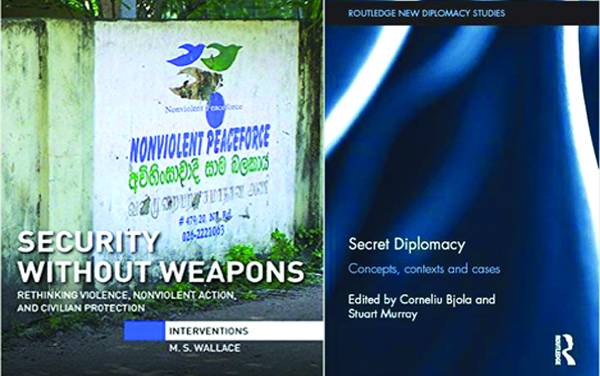
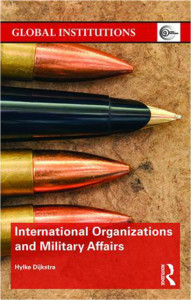
International Organizations and Military Affairs
Hylke Dijkstra
Routledge (2016)
Rs14,799
From the UN Department of Peacekeeping Operations to the NATO International Staff and the European External Action Service, international bureaucrats make decisions that affect life and death. In carrying out their functions, these officials not only facilitate the work of the member states, but also pursue their own distinct agendas. This book analyzes how states seek to control secretariats when it comes to military operations by international organizations. It introduces an innovative theoretical framework that identifies different types of control mechanisms.
The book presents six empirical chapters on the UN, NATO, and EU secretariats. It provides new data from a unique dataset and in-depth interviews. It shows that member states employ a wide range of control mechanisms to reduce the potential loss of influence. They frequently forfeit the gains of delegation to avoid becoming dependent on the work of secretariats. Yet while states invest heavily in control, this book also argues that they cannot benefit from the services of secretariats and keep full control over outcomes in international organizations. In their delegation and control decisions, states face trade-offs and have to weigh different cost categories: the costs of policy, administrative capacity, and agency loss.
This book will be of interest to scholars, postgraduates, and officials in international organizations and national governments, dealing with questions of international political economy, security studies, and military affairs.
Dr Hylke Dijkstra is an Assistant Professor (with tenure) at the Department of Political Science of Maastricht University, The Netherlands.
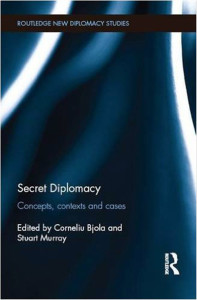
Secret Diplomacy: Concepts, contexts and cases
Corneliu Bjola & Stuart Murray
Routledge (2016)
Rs13,977
The complex relationship between secrecy and diplomacy thus figures prominently in the “dialogue between states”. Like it or loathe it, the practice of intentionally concealing information from other governments, the media and/or the public is woven into the fabric of diplomacy, both past and present. Not surprisingly, there are many detractors of secret diplomacy. Shortly after the First World War, the call for outlawing secret diplomacy rang loud and clear. The expectation was that such a move “would not bring Utopia, but it would make diplomacy honest, straightforward, clean; it would make almost impossible the chicanery, fraud, intrigue that for centuries have deluged Europe in blood and brought misery”. More recently, civil libertarians, old and new media organisations and individuals such as Edward Snowden and Julian Assange complain that the practice is excessive and outdated, mainly because secret diplomacy conflicts with privacy, liberty or transparency. In the post-modern digital age where openness is the order of the day, the “end of secrecy is nigh”. Hoarding, pilfering or sharing secrets with allies and enemies is downright sinister, amoral and anachronistic and only creates more not less security problems for states. Echoing Woodrow Wilson, the days where the media or the public are excluded or isolated from diplomacy and foreign policy are drawing to a close - open covenants of peace must be openly arrived at.
Corneliu Bjola is Associate Professor in Diplomatic Studies, University of Oxford, UK, and author/editor of four previous books, including, most recently, Digital Diplomacy (Routledge 2015).
Stuart Murray is Senior Lecturer in International Relations and Diplomacy, Bond University, Australia, and Associate Editor of the Diplomacy and Foreign Policy Journal.
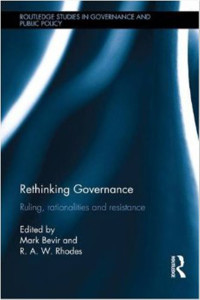
Rethinking Governance: Ruling, rationalities and resistance (Routledge Studies in Governance and Public Policy)
Mark Bevir (Editor), R. A. W. Rhodes (Editor)
Routledge (2016)
Rs14,799
This volume explores new directions of governance and public policy arising both from interpretive political science and those who engage with interpretive ideas. It conceives governance as the various policies and outcomes emerging from the increasing salience of neoclassical and institutional economics or, neoliberalism and new institutionalisms. In doing so, it suggests that that the British state consists of a vast array of meaningful actions that may coalesce into contingent, shifting, and contestable practices. Based on original fieldwork, it examines the myriad ways in which local actors - civil servants, mid-level public managers, and street level bureaucrats - have interpreted elite policy narratives and thus forged practices of governance on the ground.
Mark Bevir is Professor of Political Science at the University of California, Berkeley, USA. He is the author of various books including Interpreting Global Security (Routledge, 2013), and The Routledge Handbook of Interpretive Political Science (Routledge, 2015).
Rod Rhodes is Professor of Government, Research, at the University of Southampton, UK. He has authored and edited numerous books including, The Routledge Handbook of Interpretive Political Science (Routledge 2015). He is also a Fellow of the Academy of the Social Sciences in both Australia and the UK.
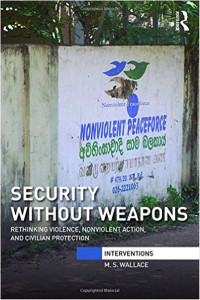
Security Without Weapons: Rethinking violence, nonviolent action, and civilian protection (Interventions)
M. S. Wallace
Routledge (2016)
Rs14,799
Few questions of global politics are more pressing than how to respond to widespread violence against civilians. Despite the efforts of Responsibility to Protect (R2P) proponents to draw attention away from exclusively military responses, debates on humanitarian intervention and R2P’s “Third Pillar” still tend to boil down to two unsatisfying options: stand by and “do nothing” or take military action to protect civilians – essentially using violence to stop violence. Accordingly – and given disagreement and uncertainty regarding moral claims, as well as the unpredictability of military effectiveness – this book asks: how can we counter violence ethically and effectively, taking action consistent with our particular moral commitments while also nurturing difference and enacting responsibility towards multiple others?
After evaluating the pragmatic and ethical failings of military action, the book proposes nonviolent intervention as a third – unarmed, on-the-ground – option for protecting civilians during humanitarian crises. In the empirical section of the book, focusing on the discursive and psychological conditions enabling violence, Wallace analyses the mechanisms by which Nonviolent Peaceforce – an international NGO engaged in nonviolent intervention/ unarmed civilian peacekeeping (UCP) – was able to protect civilians and prevent violence, even if on a limited scale, in the broader context of Sri Lanka’s war/counterinsurgency in 2008.
Both philosophically innovative and practically useful to those working in the field, the book contributes to a range of literatures and debates: from just war theory and poststructuralist ethics to nonviolent action and conflict transformation, and from humanitarian intervention, R2P, and civilian protection to strategic theory and discursive and psychological theories of violence.
M. S. Wallace is a visiting scholar in the Conflict Resolution program at Portland State University and previously taught at the University of New Hampshire and Brown University, USA.
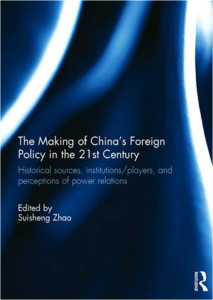
The Making of China’s Foreign Policy in the 21st century
Historical Sources, Institutions/Players, and Perceptions of Power Relations
Suisheng Zhao
Routledge (2016)
Rs15,621
This book is a study of the making of foreign policy of China, a rising power in the 21st century. It examines three sets of driving forces behind China’s foreign policy making. One is historical sources, including the selective memories and reconstruction of the glorious empire with an ethnocentric world outlook and the century of humiliation at the hands of foreign imperialist powers. The second set is domestic institutions and players, particularly the proliferation ofnew party and government institutions and players, such as the national security commission, foreign policy think tanks, media and local governments. The third set is Chinese perception of power relations, particularly their position in the international system and their position relations with major powers.
Suisheng Zhao is Professor and Director of the Center for China-US Cooperation at Josef Korbel School of International Studies, University of Denver and founding editor of the Journal of Contemporary China.

